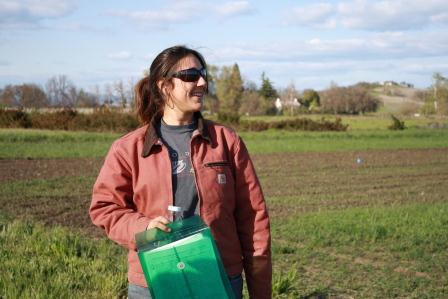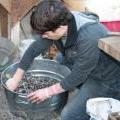Author: Melissa Matthewson, Small Farms Program, Oregon State University
Publish Date: Summer 2011
The Southern Oregon Farmer Incubator program is a collaborative of organizations working to train new and beginning farmers. The collaboration among THRIVE, Rogue Farm Corps, Oregon State University Extension, and the Friends of Family Farmers has created a three-year training program with various components. One of these components is a new project launched at the Southern Oregon Research & Extension Center (SOREC) this spring called Growing Agripreneurs. This project is funded by the Oregon Department of Agriculture’s Specialty Crop Program and run by the OSU Small Farms Program. In essence, Growing Agripreneurs consists of a one-acre teaching farm located at SOREC with a cohort of nine beginning farmers who are working and learning how to design and manage a new farm business. The focus is on the production of horticultural crops, but other topics related to all agricultural enterprises like recordkeeping, crop planning and organic certification also have been included.Part-time farm manager, Shaina Bronstein, owner of Walker Creek Farm, manages the one-acre plot which has been split quadrants for demonstration, teaching and ease of management. The plot mostly has been fallow for several years, so cover crops and grains have been planted to build soil fertility. Wheat and barley each are growing on a ¼ acre and will be harvested by mid-summer. Two types of cover crops are growing as well—an oat and pea mix, clover. Hops, strawberries, and raspberries have been planted. There are plans to include herbs and other perennials. Annual vegetables and flowers are growing on two quadrants such as eggplants, melons, and squash. At this time, the produce generated from the plot will be donated to local food banks and pantries.
The plot is under organic management with the intent of applying for certification in the coming year. Because the plot is located at SOREC, the farm manager has access to equipment and other farming resources through the research and extension branch station. During this pilot year of the program, we are learning what it takes to run a teaching farm and have identified a number of improvements to be implemented next year including construction of a proper greenhouse, a secured irrigation line, and timed irrigation.
The cohort is a diverse set of participants ranging in age and experience. Most of them live in the Ashland and Medford area. One participant currently grows vegetables for a retreat center outside Ashland; another has inherited land that he wants to develop into a vegetable farm. Yet another participant installs gardens for urban residents; another is farming an urban plot in Medford. Another participant runs a successful creamery, but has acreage he is interested in developing into a farm. All have at most a few years of limited experience farming and hope to develop sustainable and profitable farms. Shaina Bronstein says, “Students are observing the components that go into building a small farming enterprise, from planning to implementation. They are getting hands-on time working in the field. The small setting allows for in-depth discussions about each participant’s farming goals. They can focus on identifying and building the specific skills required for their individual situations.”The nine participants must volunteer two hours a week on the teaching farm and work alongside the farm manager, which allows ample opportunity for the individual. Volunteering on the farm gives participants pride in the work and the farm as well as learn how to grow on a scale that could lead to a commercial enterprise. The participants also receive one-on-one attention from Extension faculty and the farm manager. In addition to the volunteer hours, there are monthly skill building sessions that goes deeper into topics such as cultivation, irrigation, and greenhouse seeding. Each participant keeps a notebook and notes observations during farm walks.
An additional five classes through the growing season will include the basics of horticulture, irrigation, pest management, equipment, and soil fertility. For these classes, OSU Extension faculty provides resources and education, recruiting other Extension and agricultural professionals to enrich the learning experience. Participants also are able to attend farm tours and classes held by Rogue Farm Corps. Many of them will have access to a produce subsidy program and an online farmers’ market as outlets for their produce. Both of those programs are administered by THRIVE. These are the many ways that we are working with other organizations to build a comprehensive beginning farmer program for southern Oregon.We hope to continue expanding the farm over time, add acreage and livestock. Currently, the project is limited by having access to capital and grant funds to run and expand the farm. We hope to erect a greenhouse this winter and add more classes during the 2012 growing season. If you are interested in being a part of the program or have questions, please contact Maud Powell - Maud.Powell@oregonstate.edu or Melissa Matthewson - Melissa.Matthewson@oregonstate.edu at the Southern Oregon Research & Extension Center.



